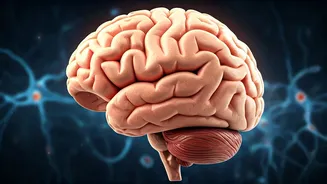Challenging Conventional Wisdom
The conventional understanding of brain function often suggests a decline in cognitive abilities with age. However, this perspective has recently been
challenged by a comprehensive study that analyzed peak cognitive performance across various age groups. Researchers have found a significant divergence from the previously held beliefs. One of the main points the study makes is that the timing of peak performance is not uniform across all cognitive domains. This new research offers a more nuanced view of the brain's lifecycle, challenging earlier assumptions about how our minds operate as we get older, and setting a stage for deeper investigation into the complexities of human cognitive abilities.
Timing Cognitive Peaks
The research revealed fascinating insights into when different cognitive abilities reach their zenith. For example, the study indicated that processing speed, often considered a youthful strength, tends to peak relatively early, around the age of 18 or 19. However, other cognitive functions, such as problem-solving skills and emotional understanding, showed peak performance at later stages. These capabilities demonstrated optimal performance in the late twenties, and even in some cases, early thirties. This highlights the adaptability of the brain and the various factors that influence its functionality. The study helps in painting a richer picture, revealing that the brain does not simply decline with age, but rather, different cognitive processes mature and peak at different times, often later than previously thought.
Brain's Evolving Capabilities
The study's findings reflect the brain's remarkable plasticity and its ability to refine abilities over the course of the lifetime. While some cognitive skills, such as raw processing speed, might peak earlier, other higher-order functions benefit from experience and accumulated knowledge. These functions involve complex decision-making, strategic thinking, and emotional intelligence. The brain continues to develop and improve, even into the later years, though different mechanisms are engaged. This suggests that the age at which we reach our cognitive peak is not a single number, but rather a dynamic process influenced by various factors. These include life experiences, learning, and environmental conditions, shaping how different areas of the brain mature at their own unique pace.
Lifestyle's Impact on Cognition
While the study indicates the potential for later cognitive peaks, it's also important to acknowledge the crucial role of lifestyle factors in brain health. Regular physical exercise has consistently been linked to better cognitive function, including improved memory, focus, and overall brain health. Additionally, a diet rich in nutrients, particularly those found in fruits, vegetables, and omega-3 fatty acids, can support brain function and promote longevity. Mental engagement through activities like reading, learning new skills, and puzzles can also help in keeping the brain sharp. Getting adequate sleep is another vital part of maintaining cognitive performance. The study thus underscores the significance of a holistic approach to maintaining cognitive health across all ages and life stages, regardless of the age at which we are told our brains function best.
Implications and Applications
The research findings have wide-ranging implications, affecting everything from education and career planning to healthcare. Understanding that certain cognitive skills reach their peak at different times can help in tailoring educational programs and career paths to match an individual's stage of cognitive development. The findings may also influence healthcare strategies, prompting healthcare providers to adapt interventions and treatments based on the age-related cognitive strengths and weaknesses of patients. Moreover, it encourages individuals to take proactive steps to maintain brain health throughout their lives. The research contributes by creating a basis for a more informed and personalized approach to cognitive well-being. This study prompts us to rethink our assumptions about aging and cognitive performance, and opens up new possibilities for optimizing brain health at any age.












